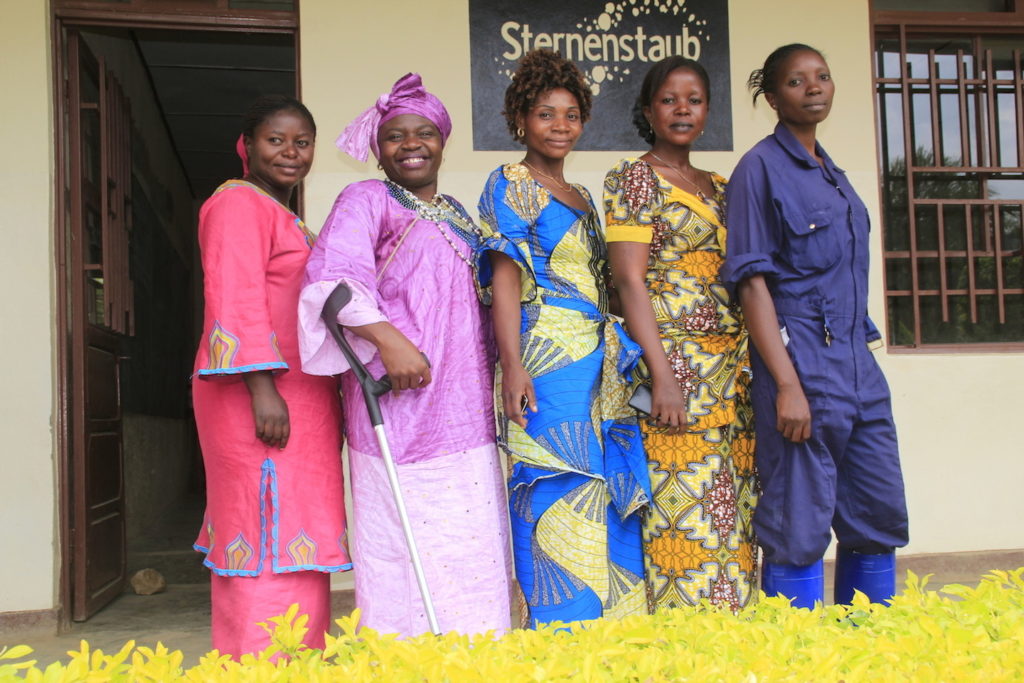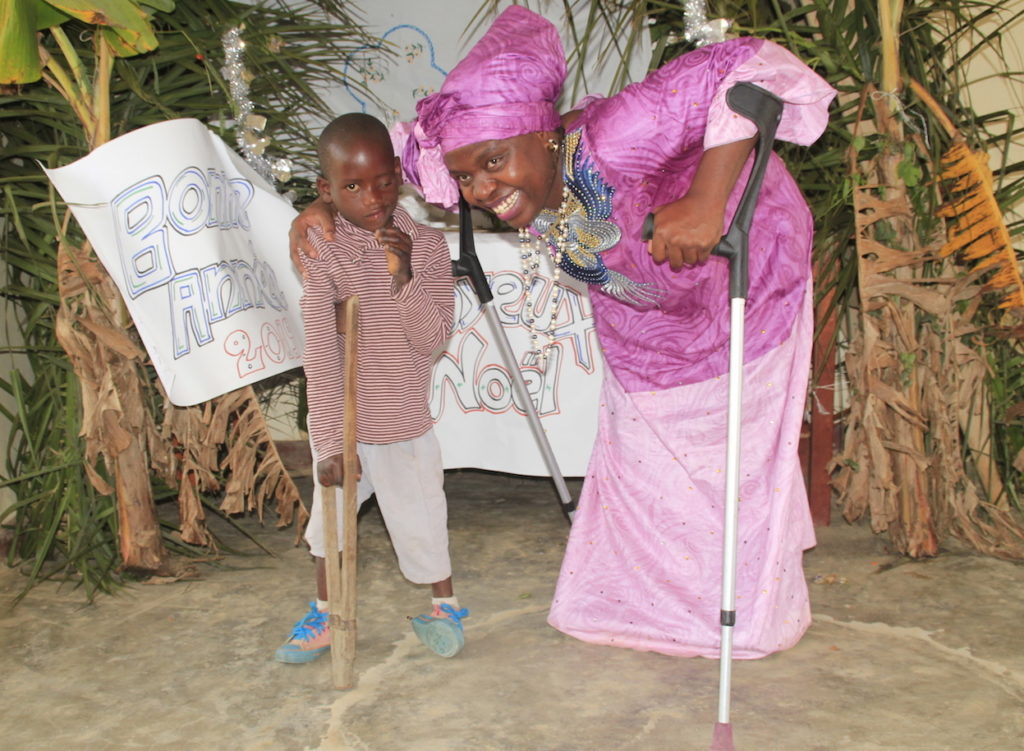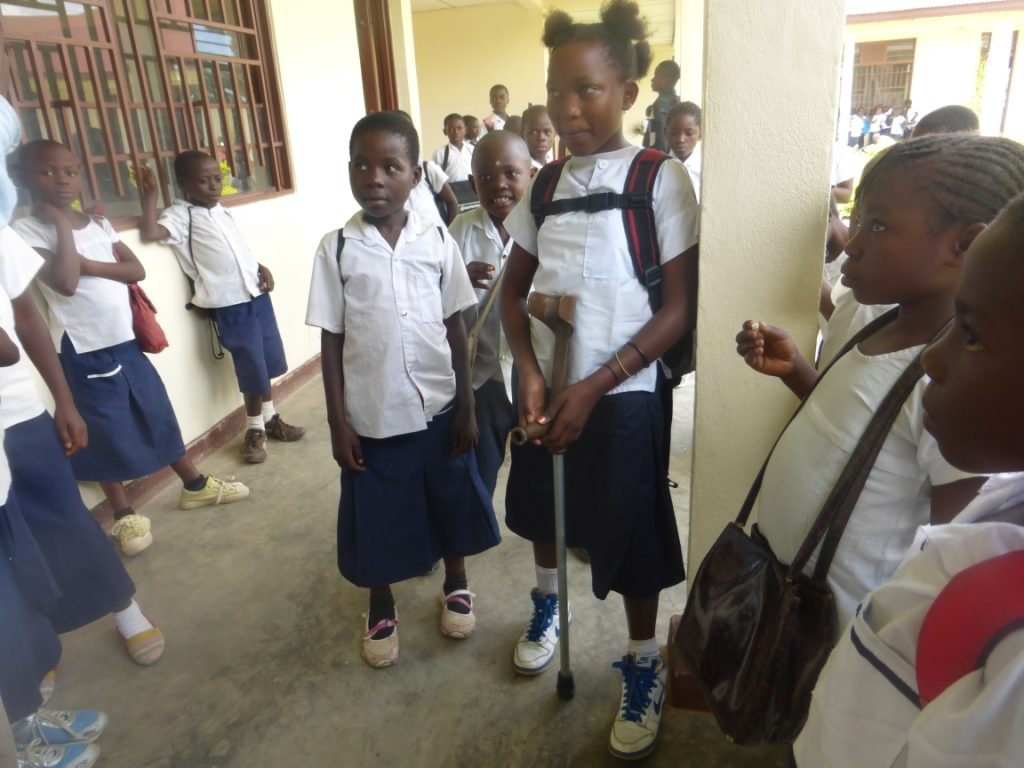Harold Elletson talks to Congolese champion of disabled people and one of Africa’s most remarkable educators – Hortense Kavuo Maliro
In August 2016, three days after a visit by the President of the Democratic Republic of Congo, Joseph Kabila, to the province of North Kivu in the north east of the country, a group of armed men, some of whom were dressed as soldiers, came out of the forests surrounding the town of Beni, which lies at the foot of the Rwenzori mountains, and hacked at least 64 people to death. The massacre was one of a number of similar attacks on the town since 2014, which have resulted in the deaths of more than 700 people. In the aftermath of the 2016 attack, the President sent his Prime Minister, Augustin Matata Ponyo, to restore order but his visit led to further violence, in which a man suspected of being a supporter of the ADF rebels was stoned and burnt to death.
The bloodshed in Beni was hardly noticed by the international community, which was preoccupied at the time with its own concerns – the US Presidential elections and the shock of ‘Brexit’ in Europe. What attention there was to Beni was only paid by unusually perceptive figures, such as Pope Francis, who called the silence of the West “shameful.”
“My thoughts,” he said, “go to the people of North Kivu, in the DRC, who have been recently hit with fresh massacres, which have for some time been perpetrated in shameful silence, without attracting even as much as our attention. Unfortunately, they are part of the too many innocent people who have no weight on world opinion.”
Recently, in June 2019, there was another attack, in which 25 people were killed or wounded. Once again, the international community has paid little attention. In the midst of such darkness, from which the world apparently seeks to hide its face, it is difficult to find any light. One ray of hope, however, comes from a remarkable woman – Hortense Kavuo Maliro.

Hortense is the founder of the ‘We are the World School’ – a project of the AISHP (Association pour l’Intégration Sociale des Handicapés Physiques), a non-profit organisation, which she also founded, that fights the marginalisation of disabled and vulnerable people.
It is almost impossible for an outsider to imagine the scale of the task facing her when she began trying to change attitudes towards disabled people in the DRC, which for much of the past quarter century has been one of Africa’s most violent, lawless and war-torn countries. Born in Goma in 1979, she was diagnosed with polio as an infant and the disease has left her paralysed below the waist.
“I am the fourth daughter in a large family of 10,” she says. “I have lived with a physical disability in both legs since my childhood. I grew up with this disability knowing that I was a victim of polio. But when I was growing up, my grandmother told me the truth that my disability was caused by an injection. I was ill and the doctor gave me a strong dose which crippled me.”
Life was not easy for disabled people in Kivu, which at the time, along with the rest of the DRC, was part of the Republic of Zaire, a one-party totalitarian state, run by Mobutu Sese-Seko and his Popular Movement of the Revolution. Many families simply abandoned children if they had disabilities or crippling diseases, such as polio. Victims of the disease were left to crawl and often thrown onto the street. Hortense was fortunate that her family was different.
“The good Lord gave me the grace of having wonderful parents, who didn’t consider my handicap a problem. They looked after me very well. They fully integrated me into society. There was no discrimination between me and my brothers. We were all equal.”
Her father was determined that she should be able to look after herself, in spite of her disability. He went to great lengths to help her both to come to terms with her condition and to gain the independence to be able to manage.
“My father never wanted me to be dependent. He did his best to get me orthopaedic equipment for my mobility. He always said: ‘my daughter, I don’t want to see you on a wheelchair because that would mean that you would have to have someone to push you, which would not be good for you.’ I began to use orthopaedic braces and crutches when I was 3 years old. I was very small but I managed quite well.
“Every time I grew, my father got me new ones at the centre for the disabled in Goma and so on right up until 2001. I am among the few disabled people who have been able to change their orthopaedic braces twice a year because my father could afford it. He worked for various big companies.”
Hortense was also fortunate in her education.
“I also had the chance to attend some good schools in Goma and when I got my secondary school State Diploma in business and administration, thanks to Mrs Lyn Lusi, who was the Programme Manager of HEAL AFRICA, I received a bursary to go and study at the National University of Rwanda in Butare (Huye), where I got my degree in monetary and banking economics.”
Perhaps because of her father’s influence, she has never allowed her disability to get the better of her. Indeed, in many ways, it has become the spur that has driven her on to a lifetime of remarkable achievement, characterised by her ability repeatedly to overcome seemingly overwhelming odds.
“I am an ambitious and combative girl,” she says. “I always wanted to ‘escape my marker’ and make a difference. My disability has not been a brake or a block on my life in any way at any level. I have been an adviser to the private office of the Minister of Social Affairs, Humanitarian Action and National Solidarity. I have worked with the UNHCR in camps for internal refugees, Heal Africa, DGDA, Sauti ya mama Mukongomani… I have even been a candidate for the National Assembly in the legislative elections of 2011. I founded AISHP. I am the promoter of the We Are The World School. I am often involved in activities linked to the resolution of conflict and the reestablishment of a lasting peace in the Great Lakes region. I have participated several times in conferences organised by eLearning Africa. All this is to experience what others think is inaccessible and to prove to everyone that you are capable of doing great things in spite of your disability because wanting something is the first step to being able to do it.

“Those who believe that disability is a problem must change this way of thinking. I like to set an example, to be the sample. I don’t like negative thinking. I like to live for the day, accepting my situation. Disabled people themselves need to understand that life is a struggle; they cannot cross their arms and wait but instead they too must make an effort towards their integration at the centre of society, where they can live a full life and contribute to the development of their home country.”
The AISHP has been the main focus of Hortense’s activities to alter perceptions and change the lives of disabled people in the DRC. A non-profit organisation, it aims to provide practical solutions to some of the many problems faced by disabled people in the DRC.
“In my country, people with a disability are marginalised, the majority have not been to school and are on the street, leading a miserable life begging. It was to defend their rights and champion equality that I founded AISHP in 2003.
“Since the creation of AISHP, 1084 people with a disability have been supported in their studies and 28 have obtained university degrees. Among the 28, only 8 have so far found a job. The others are still unemployed, hoping that one day they will find one, even though life for the majority of Congolese is still precarious.”
Not being able to secure access to education is one of the major problems facing disabled people in the DRC. It was for this reason that Hortense decided that the AISHP had to make education the primary focus of its activities and the ‘We Are The World School’ was established in 2014. With Support from the German charitable foundation Sternenstaub, it provides an education for both disabled and non-disabled children from poor families.
“In order to establish my vision in participating in the sustainable development of the DRC, a modern, inclusive school was constructed in the community of Bungulu in the district of Mabango in the town of Beni, thanks to finance from the Sternenstaub Foundation. The DRC needs real experts and patriots for its development and to achieve this I considered it essential to invest in the education of children, victims and all the worst: to fight against illiteracy and the phenomenon of child soldiers in this place, which has been bruised by war for a long time, and to give all these children the chance of going to school because the place for a child is not in the forest behind a Kalashnikov.
“The We Are The World School is a humanitarian type of school. It opened in September 2014. Between 2014 and 2019, We Are The World School has already been responsible for a total number of 932 vulnerable children (internal displaced persons, orphans, disabled…) whose age varies between 5 and 16. Normally, you have to finish primary education at 12 but we have those of more than 12, above all to offer them a chance and to break early marriage.”

The school has not simply succeeded in educating 932 vulnerable children but it has also begun to change attititudes, with parents now beginning to accept that education is for girls too and that, as Hortense puts it, “they have to give girls a chance and to stop their backward ideas that only boys should study and that girls are made to get married…” There is now what she calls a “peaceful cohabitation and solidarity between the parents and the pupils” and many girls, who would previously have been pushed into early marriage “proudly go off to school.”
Beni is in a so-called “red zone,” where there is still conflict between government troops and rebels but Hortense is sure that the school has saved many children not only from delinquency, but also from being recruited as child soldiers.
She is also convinced that, thanks to the school, a path towards a new future for the whole area has opened up. “Hope is being reborn in parents, who can see the dreams of their children, after five years here, becoming reality.”
The school faces continuing difficulties, though. The situation in the east of the DRC is a constant cause of concern; sporadic outbreaks of fighting and killings have meant that many families have been unable to tend to their land. This has had an effect on many schools in the region, with children coming to school hungry and, in many areas, the start of the school year being delayed. “Parents can’t get to their fields, so they can’t feed their children,” says Hortense. In such circumstances, it is perhaps hardly surprising that she describes her school as “vulnerable.”
The security situation in the region is far from being the only threat to the school, though and perhaps it is not even the most serious one. North Kivu has recently been hit by a devastating new crisis in the form of a series of outbreaks of EBOLA. Between 20 May and 10 June, 10 per cent of the 664 health districts in the region reported new cases of the disease and a report by the World Health Organisation (WHO) referred to Beni as a “hotspot.” Nevertheless, Hortense is confident that the parents and pupils at the school are well prepared and “have an understanding of the fight against the EBOLA virus, which has been officially declared in Beni since 2018.”
As though such existential threats were not enough, the school faces a host of other difficulties, most of which are linked to a lack of funds and a host of other pressing needs, including staff wages, stationery, medical support, drinking water, teacher training and the lack of recreational facilities (“construction of a play area and a big theatre would help with the detraumatisation of children in view of the horrors of war in this area, of which they are the victims.”)
Introducing new technology is also vital if children are to acquire the skills to survive and prosper in the modern age – or even, as Hortense hopes, to become future leaders of the DRC.
“We are in the middle of introducing, little by little, technology into the heart of the school. The school has a dozen laptops and 30 tablets. All other new technologies are welcome. Moreover, that is the ideal way for the school to move forward.”
In spite of all these difficulties facing her, her school and her country, Hortense remains optimistic – the result, no doubt, of overcoming so many seemingly insurmountable obstacles in the past.
“My hope for myself is that, before I leave this earth, I will manage to fulfil my dream of a better Congo in the future and my country being at the centre of an Africa with all its potential and that it will be able to open itself up to other African countries, so that its relationships… will be beneficial both for the development of the DRC and for the development of Africa.”
And she has no doubt that disabled people, who for so long have been ignored and marginalised, will have a big role to play in making her dream a reality.
“For Africa, disabled people must play an integral part in the fulfilment of the African vision 2063.”
The vision, which is set out in the African Union’s 2063 agenda, is of a “transformed continent” and one thing is for sure: if Hortense has her way, Africa’s transformation will only be complete when disabled and marginalised people are at the heart of African society.
Hortense Kavuo Maliro will be a highlighted speaker at this year’s ‘eLearning Africa’ conference, which will take place in Abidjan, Cote d’Ivoire, from 23 – 25 October. Full details can be found at the conference website: www.elearning-africa.com or by contacting the eLA press department at press@icwe.net
More information about the We Are The World School is available here: www.wearetheworldschool.com. The website also contains information about how to support the school and its activities.



















Hortense Kavuo Maliro. You are an inspiration to me especially that you operate in a country which in the past had political instability.Further, you are a shining star to many in Africa.Few can manage what you are doing.My prayer is that GOD Almighty continues to richly bless you.